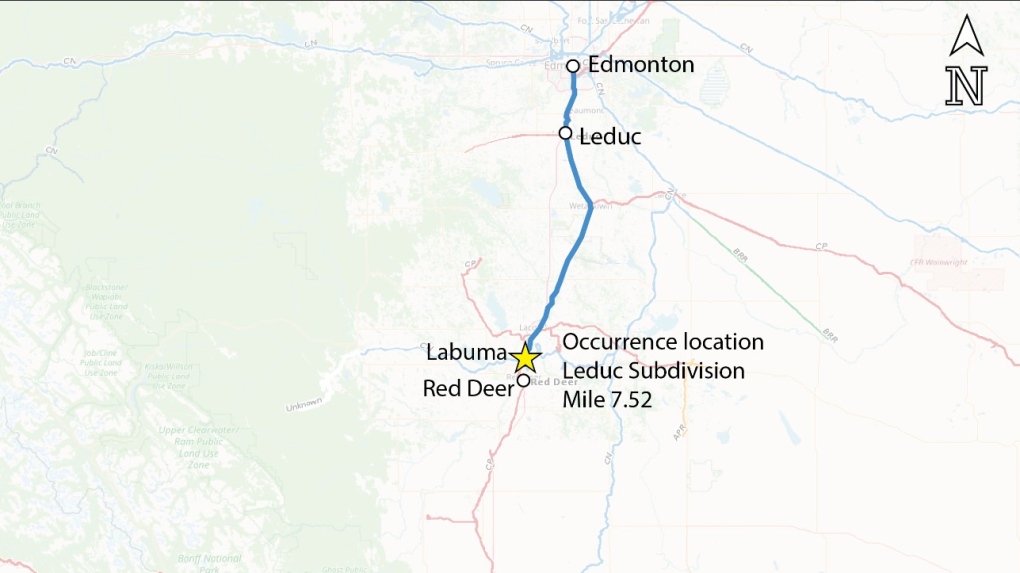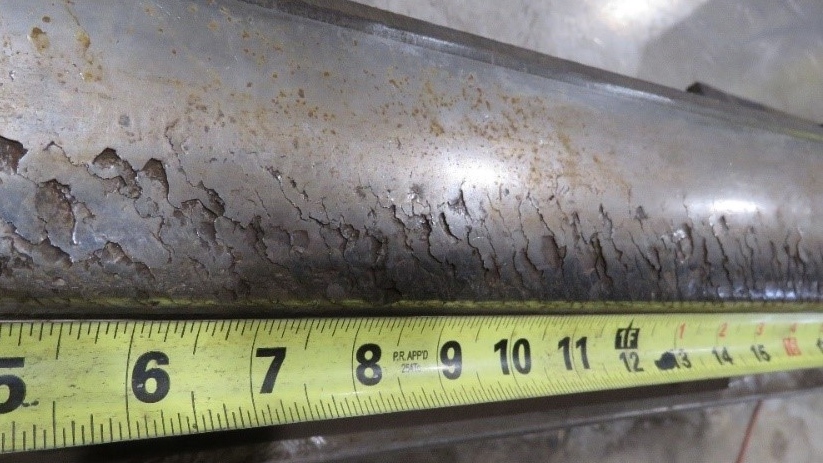2019 derailment in central Alberta caused by 'undetected' rail defect: TSB
 Damage to three Canadian Pacific rail cars after a train derailment in September 2019 near Blackfalds, Alta. (Source: TSB)
Damage to three Canadian Pacific rail cars after a train derailment in September 2019 near Blackfalds, Alta. (Source: TSB)
A 2019 train derailment in central Alberta was caused by an “undetected” rail defect, despite testing performed 30 days before the incident.
According to the Transportation Safety Board (TSB), on Sept. 27, 2019 a Canadian Pacific Railway 75-car mixed freight train was southbound at 20 miles per hour when it derailed near Blackfalds, Alta., at around 10:36 p.m.
The TSB released its safety investigation into the incident on Monday.
Nine cars derailed, although only three cars leaked flammable fluids. The train spilled approximately 107,200 litres of diesel from one car and more than 188,000 litres of octane from two cars. The derailment destroyed or damaged about 500 feet of track.
 (Source: TSB)
(Source: TSB)
Location of the train derailment near Blackfalds, Alta. in September 2019 (Source: TSB)
“Appropriate measures were taken by the railway, local first responders and federal and provincial authorities to protect the site and ensure public safety immediately following the derailment,” the TSB said in a statement.
The investigation into the incident found that “a sudden failure of the rail” occurred when a track defect that had been previously undetected for some time “had grown to a critical size.”
“The rail broke when it could no longer support the load of the passing train,” the transportation authority said.
Despite a quality test being performed 30 days prior to the derailment, no defects had been detected, the TSB said. According to the agency, the rail surface condition “adversely” affected the ability for inspection equipment to properly detect faults.
The federal transportation authority added that the wear on the rail “exceeded” railway requirements and should have been replaced.
“The rail remained in service until an undetected defect progressed to the point of failure,” the TSB said.
 (Source: TSB)
(Source: TSB)
A piece of track recovered from the derailment that was analyzed for fatigue defects (Source: TSB)
All cars that released flammable fluids were complaint with federal legislation, the agency added.
“While only three cars lost product, there was potential for more catastrophic consequences.”
The safety investigation report noted that CP upgraded all the track infrastructure after the derailment and followed new guidelines issued by Transport Canada in November that year that implement speed restrictions for “higher risk key train(s).”
In 2019, there were more than 111,000 cars carrying dangerous goods transported along CP’s Leduc Subdivision between Edmonton and Red Deer.
Blackfalds is about 16 kilometres north of Red Deer.
CTVNews.ca Top Stories

Quebec nurse had to clean up after husband's death in Montreal hospital
On a night she should have been mourning, a nurse from Quebec's Laurentians region says she was forced to clean up her husband after he died at a hospital in Montreal.
Cuban government apologizes to Montreal-area family after delivering wrong body
Cuba's foreign affairs minister has apologized to a Montreal-area family after they were sent the wrong body following the death of a loved one.
What is changing about Canada's capital gains tax and how does it impact me?
The federal government's proposed change to capital gains taxation is expected to increase taxes on investments and mainly affect wealthy Canadians and businesses. Here's what you need to know about the move.
'Anything to win': Trudeau says as Poilievre defends meeting protesters
Prime Minister Justin Trudeau is accusing Conservative Leader Pierre Poilievre of welcoming 'the support of conspiracy theorists and extremists,' after the Conservative leader was photographed meeting with protesters, which his office has defended.
Northern Ont. lawyer who abandoned clients in child protection cases disbarred
A North Bay, Ont., lawyer who abandoned 15 clients – many of them child protection cases – has lost his licence to practise law.
'One of the single most terrifying things ever': Ontario couple among passengers on sinking tour boat in Dominican Republic
A Toronto couple are speaking out about their 'extremely dangerous' experience on board a sinking tour boat in the Dominican Republic last week.
Boeing's financial woes continue, while families of crash victims urge U.S. to prosecute the company
Boeing said Wednesday that it lost US$355 million on falling revenue in the first quarter, another sign of the crisis gripping the aircraft manufacturer as it faces increasing scrutiny over the safety of its planes and accusations of shoddy work from a growing number of whistleblowers.
Bank of Canada officials split on when to start cutting interest rates
Members of the Bank of Canada's governing council were split on how long the central bank should wait before it starts cutting interest rates when they met earlier this month.
Fair in Ontario, flurries in Labrador: Weather systems make for an erratic spring
It's no secret that spring can be a tumultuous time for Canadian weather, and as an unseasonably mild El Nino winter gives way to summer, there's bound to be a few swings in temperature that seem out of the ordinary. From Ontario to the Atlantic, though, this week is about to feel a little erratic.
































